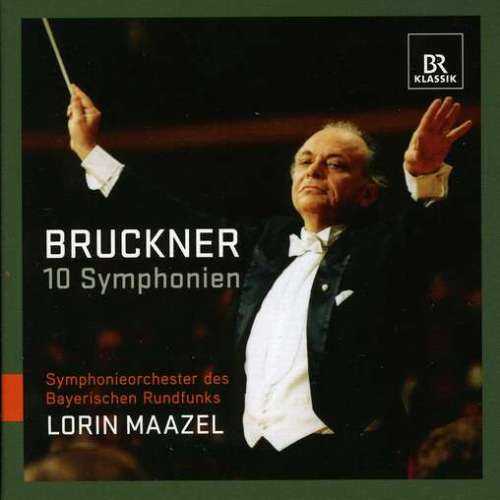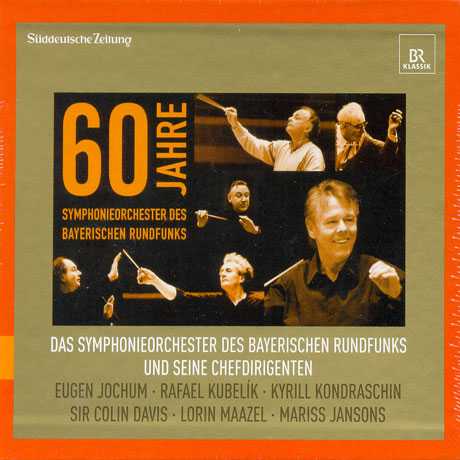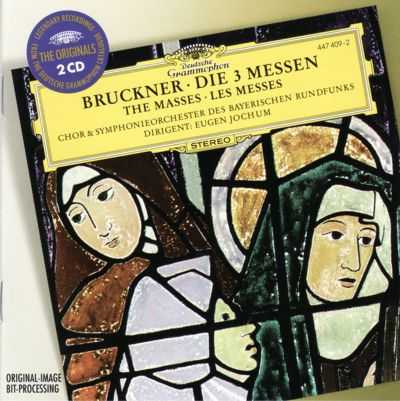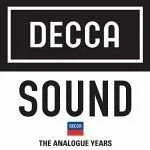
Composer: Anton Bruckner
Orchestra: Symphonieorchester des Bayerischen Rundfunks
Conductor: Lorin Maazel
Audio CD
Number of Discs: 11 CD box set
Format: FLAC (tracks)
Label: BR Klassik
Size: 2.56 GB
Recovery: +3%
Scan: yes
CD 01
Symphony No. 0 in D minor – WAB.100
I. Allegro
II. Andante
III. Scherzo: Presto – Trio: Langsamer
IV. Finale: Moderato
CD 02
Symphony No. 1 in C minor – WAB.101
I. Allegro
II. Adagio
III. Scherzo: Lebhaft. Schnell
IV. Finale: Bewegt, feurig
CD 03
Symphony No. 2 in C minor WAB.102
I. Moderato
II. Andante: Feierlich, etwas bewegt
III. Scherzo: M ig schnell
IV. Finale: Ziemlich schnell
CD 04
Symphony No. 3 in D minor WAB.103
I. M ig bewegt
II. Adagio, bewegt, quasi Andante
III. Scherzo: Ziemlich schnell
IV. Finale: Allegro
CD 05
Symphony No. 4 in E flat major Romantic WAB.104
I. Bewegt, nicht zu schnell
II. Andante, quasi allegretto
III. Scherzo: Bewegt. Trio: Nicht zu schnell
IV. Finale: Bewegt, doch nicht zu schnell
CD 06
Symphony No. 5 in B flat major WAB.105
I. Adagio. Allegro
II. Adagio
III. Scherzo: Schnell
IV. Finale: Adagio. Allegro
CD 07
Symphony No. 6 in A major WAB.106
I. Maestoso
II. Adagio: Sehr feierlich
III. Scherzo: Ruhig bewegt, etwas gemessen
IV. Bewegt, doch nicht zu schnell
CD 08
Symphony No. 7 in E major WAB.107
I. Allegro moderato
II. Adagio: Sehr feierlich und sehr langsam
III. Scherzo: Sehr schnell
IV. Finale: Bewegt, doch nicht zu schnell
CD 09-10
Symphony No. 8 in C minor – WAB.108
I. Allegro moderato
II. Scherzo: Bewegt, lebhaft
III. Adagio: Feierlich langsam, doch nicht schleppend
IV. Finale: Feierlich, nicht schnell
CD 11
Symphony No. 9 in D minor WAB.109
I. Feierlich, misterioso
II. Scherzo: Bewegt, lebhaft
III. Adagio: Sehr langsam, feierlich
maazel_bruckner_10_symphonien02.rar – 249.1 MB
maazel_bruckner_10_symphonien03.rar – 270.4 MB
maazel_bruckner_10_symphonien04.rar – 242.6 MB
maazel_bruckner_10_symphonien05.rar – 263.1 MB
maazel_bruckner_10_symphonien06.rar – 318.5 MB
maazel_bruckner_10_symphonien07.rar – 256.6 MB
maazel_bruckner_10_symphonien08.rar – 255.8 MB
maazel_bruckner_10_symphonien09.rar – 138.0 MB
maazel_bruckner_10_symphonien10.rar – 220.1 MB
maazel_bruckner_10_symphonien11.rar – 289.1 MB
With a different mindset, these are striking.
First I must thank the reviewers here, even those who gave it two stars, for inspiring me to give yet another listen to this set, after I had already listened through twice, and subsequently had it on the discard pile.
No, this is not one’s first or only Bruckner set, but it has great value, if you are willing to do the following:
Sit back, with no distractions, and let it flow over you. It might feel slow at first, but it will seem interesting and, then, eventually, inevitable. Everything takes its time here. One reviewer calls it “glacial,” yet glaciers are majestic and expansive and no one is foolish enough to want to to rush it; one must be willing to surrender to these performances.
That is how I approached these, and got great richness from these performances.
My contexts: I just got rid of the Maazel/Sony big-box because nearly all of it was just plain pallid, My favorite Bruckner “completes” are Wand/Cologne and Karajan/DG, Barenboim/Teldec, and I’ve enjoyed the budget Paternostro, although I’ve given it away as a gift simply because of the shelf-space factor (I own too many of these sets). I’ve only heard some of the Celibidache, and I haven’t played my Jochum/DG for quite some time for no particular reason.
Editor, AcousticLevitation.org Journal of Music and The Arts
A Sublime Bruckner Cycle
What a surprise! As with many listeners, I have been at best an intermittent admirer of Lorin Maazel’s artistry. In the past, I have often found his interpretations frustrating (example: his brisk and breezy traversal of the Sibelius symphonies with the VPO), though occasionally exhilarating (example: his classic rendition of Prokofiev’s *Romeo and Juliet* ballet with the Clevlanders).
None of my previous listening, however, prepared me his remarkable live Bruckner cycle with the BRSO. The finest of these renditions are nothing less than visionary. But i must qualify this remark right away: First, this assessment comes from a reviewer who hugely enjoys Celibidache’s Bruckner. If you find that conductor’s slow tempos and meditative manner frustrating, you will probably react similarly to Maazel in Bruckner. Second, Maazel is not always on form even here; some movements prove more convincing than others, and there is at least one performance that I would characterize as disappointing overall–namely, Maazel’s rendition of the Fifth.
What is it that I find so uplifting about the best of these performances? It is difficult to express exactly what these virtues are. As we all know, there is something ineffable, even magical, about Bruckner’s way of evoking a sense of Transcendent Mystery. And perhaps this very quality is what Maazel manages to convey so strikingly well; and precisely for this reason, one is at a loss for accurate descriptors for what exactly the conductor (and the orchestra) are doing to communicate this essential aspect of Bruckner’s music. At very least, it has something to do with Maazel’s uncanny ability to “float” melodic lines, even in densely contrapuntal textures, and also to resist hyping the drama, even at climactic moments. In fact, it is this latter characteristic that some listeners have found disconcerting, or have interpreted as a certain lack of conviction or enthusiasm on the conductor’s part. But most definitely Maazel is NOT bored with this these scores (as he can sometimes seem to be in his recordings of other composers). Yes, tempos are often very slow (sometimes even slower than Celi, though not by much) and the manner is maximally contemplative. Bruckner’s grand pauses are given ample space not only to distinguish structural “blocks,” but more importantly to evoke “the silence of Eternity.” indeed, I have never encountered a Bruckner cycle, not excluding Celibidache’s, that more consistently conveys a sense of mystical rapture. When the set arrived, I first auditioned the Second; how a conductor fares in that work is usually a reliable predictor of how the rest of the cycle will go. Not to mince words: I was swept away by the astonishing luminosity of the playing, and what I can only call the “compassion” (Buddhistic or Christian, I cannot tell) of the conductor’s manner. This luminosity (in every department of the orchestra) and this compassionate tone, is found–to a greater or lesser extent–in every one of these performances. But for a fuller account of the “greater” and the “lesser, I must turn to a brief assessment of each symphony.
No. “0”: The cycle begins with a magnificent account of this elusive work. Though this is relatively early Bruckner (having been composed in the interval between the First and the Second), Maazl doesn’t condescend to it. Indeed, his ability to sustain tension over long periods, together with the blend of vigor and stateliness, makes this work seem more mature than it is. I have heard many renditions of this work that did not convince; this one does, more fully than any I can recall.
No. 1: This is the lightest and also least characteristic of Bruckner’s symphonies. Maazel’s manner might seem ill-suited to it, yet he manages to convey well both the restless dynamism as well as the moments of repose. The finale is quite dashing, and the audience responds, appropriately, with enthusiastic applause.
No. 2: As indicated above, this is the most rapturously beautiful account of this work I have ever heard. It surpasses every one of my previous “favorites,” such as Giulini/VSO and Jochum/Dresden.
No. 3: Overall, a relative disappointment. This work needs to grip the listener with a sense of inexorable movement from the first bar to the last. But Maazel tends to dawdle here (not itself a matter of slowish tempos), and the more tumultuous climaxes don’t convey a sufficient sense of urgency. Moreover, those wonderful polka-chorale episodes in the finale are on the bland side. On the other hand, the slow movement is lovingly shaped and quite effective.
No. 4: Another great performance. Maazel lyrical and leisurely approach reminds me of Bruno Walter. Like Walter, Maazel manages to convey a sense of beatific rusticity (that’s the only way to describe it). Unlike Walter’s version, however, the BRSO manage to play with much greater discipline and panache than Walter’s pickup orchestra.
No. 5: The one big disappointment in the set, at least for me. Maazel doesn’t seem entirely in sympathy with this massive and majestic work. Perhaps to avoid the pitfall of pomposity, he downplays every climax in the finale; that final entrance of the chorale theme in the coda should be apocalyptic–but here it sounds merely cheerful. More seriously, the second movement is inexplicably rushed off its feet. I think Maazel may have chosen such a brisk tempo in order to allow the oboist to convey an appropriate sense of line at the opening. The two-against-three cross-rhythms in this passage can sometimes risk fragmenting the oboe’s plaintive melody when taken too ponderously. But Maazel’s solution–if it was intended as such–simply doesn’t work. It commits him to a basic tempo that, in the end, makes one of Bruckner’s most luxuriously expansive movements seem perfunctory.
No. 6: This elusive work baffles most conductors–to the consternation of every avid Brucknerian. Inexplicably, the number of recorded versions that do justice to what is, in many ways, the composer’s most cogent symphony, is vanishingly small. My own favorites remain Klemperer (stern and severe, yet uniquely compelling), Stein (more lyrical, and gorgeosly played by the VPO) and Celibidache (who does particularly well in realizing the full stature of the slow movement). Maazel’s rendition can’t quite match theirs, but it is fine in its slowly-unfolding and unpretentious way. Others have made more of that heavenly coda of the first movement, with its angelic antiphonal brass colloquies; but overall a very enjoyable performance, and one that does manage to convey a quiet sense of rapture throughout.
No. 7: Once again, Maazel matches and even surpasses the greatest versions of the work I know (Karajan/EMI, Jochum/DG, Knappertsbusch and Giulini). The long opening paragraph of the first movment seems ideally suited to Maazel’s approach, and he manages to fulfill our highest expectations. The great slow movement builds toward its climax inexorably and compellingly. And the finale, for once, doesn’t seem like a let-down, but a genuine summing-up. A great performance. But, I have discovered, his earlier account of this work with the BPO for EMI is, if anything, even finer. The interpretation is similar, but the orchestral playing (nurtured, of course, by decades of Karajan’s Bruckner) is quite astonishing in its collective virtuosity.
No. 8: Here, too, Maazel’s earlier studio account for EMI has the edge, if only because the playing of the BPO is so stunning. This is not to slight the BRSO, however, who also play splendidly, if without the sumptuous tone of the Berliners. The two versions make for some interesting comparisons. The Bavarian strings sound relatively thin when compared to those of the BPO; however, the wind and brass playing seem to have greater character in Munich. Indeed, the phrasing is more affectionate in the later version, which also conveys the work’s spacious grandeur to more telling effect. But both versions are excellent, and must rank with the finest I have heard: Giulini; Karajan/VPO; and any of Furtwängler’s devastatingly intense performances.
No. 9: The cycle concludes with a very satisfying rendition of the Ninth. The extremely leisurely tempos will give pause (perhaps for a nap) to many listeners. But, like Celibidache, whose performances of this work resemble Maazel’s in many ways, tension is maintained effectuvely throughout the long paragraphs of the first and third movements. I would prefer a snappier Scherzo; but Maazel still manages to convey the astonishing brutality of the outer sections. Did any Nineteenth-century composer ever write such modernistic music as this? Bartok and Stravinsky never wrote anything quite as shockingly “primitivistic” as this “Scherzo” (no joke; Bruckner is deadly serious). And, speaking of modernistic anticipations, those crushing dissonances at the climax of the Adagio have rarely if ever been so tellingly conveyed as they are in Maazel’s performance. Indeed, Maazel gives something like a total realization of this exhausting–yet, in the end, uplifting, torso.
How to sum up Maazel’s accomplishment here? Suffice it to say that, when he is at his best, he belongs with the elite of Bruckner interpreters–namely, Karajan, Furtwängler, Giulini and Celibidache, though his priorities are often quite different from theirs. His Bruckner style most resembles that of Celibidache, yet Maazel’s textures are lighter and the lyrical sections float more serenely and sing more sweetly. With Celibidache, however, Maazel favors leisurely, and at times even glacial, tempos. Whether that is too much of a good thing (or a good thing at all) will depend on each listener’s tastes and preferences. What keeps Maazel’s approach from sounding lazy is his ability to maintain an inexorable sense of development over the longest structural spans. Climaxes emerge, as they should, organically and inevitably, without undue overemphasis. As such, except in a few cases where Maazel misses the mark, they are more effective for not being made to sound melodramatic.
So, with the exception of Maazel’s Third and Fifth, I would not hesitate to call this live Bruckner cycle “sublime.” The engineers deserve praise as well for providing sonics that convey a warmth and naturalness commensurate with the interpretations. The orchestra is somewhat distantly observed, yet there is no want of vivacity. The softest passages tell, and the loudest ones do not assault the ears.
This may be Maazel’s greatest achievement on record. Don’t miss it.
Maazel and the BRSO – The Thinking Man’s Bruckner….
There are very many Bruckner cycles in the catalogue, but there are few that match the excellence of this Bruckner cycle from Lorin Maazel and the Bavarian Radio Symphony Orchestra, in my opinion. Maazel’s Bruckner is the antithesis of the anonymous, anodyne, and quite frankly, amateurish efforts you’ll experience if you are unfortunate enough to listen to “flavour of the month”, Andris Nelsons’ Bruckner… Maazel’s Bruckner presents a cerebral workout and Nelsons’ Bruckner delivers tunes for the new demographic… Nelsons is the European equivalent of Dudamel, and Maazel’s reputation has little to do with marketing hype or images in glossy magazines and has everything to do with a refined sensibility, rare intelligence and raw musical talent and an absolute dedication to music. Maazel’s Bruckner shows him to be an original thinker as his interpretative style has a uniqueness which will catch the uninitiated off-guard. Maazel adopts relatively broad tempi, but certain movements are more brisk and energized which surprises… tempi fluctuations occur within movements, which is reminiscent of Furtwangler’s and Jochum’s way with this music, but Furtwangler was far more extreme in his pulling the music about… start-stop, violent accelerandi, long pauses, rushing the fences… Furtwangler was a master of his craft! Of course Bruckner mavens will know that Karajan forged the “new way” with his sleek, streamlined “long-line” approach which appeals to most listeners… and Gunter Wand “played it straight” – very Teutonic – and there are no wilful interpretative gestures from Wand, that’s for certain. And if Karajan forged the “new way”, then Celibidache ploughed his own furrow. In fact, Celibidache dug himself a very wide and deep trench which many listeners avoid… glacial tempi – divine inspiration or watching paint dry?
So, how does Maazel’s Bruckner fare when confronted with fellow Brucknerians’ interpretations? Well, Maazel’s Bruckner is absolutely magnificent, and one need only listen to Maazel’s glorious account of the Eighth which is truly monumental, epic in scale and brings transcendence… I know of no finer recording. The Bavarian brass with its round and fulsome tone is outstanding throughout, and the strings deliver legato in abundance, singing sweetly and biting hard when necessary. The timpani is power incarnate -“Donner und Blitzen” – and will impress with it’s sheer visceral impact. And those mighty brass chorales will transport the listener to Elysium… I found the Fifth very much to my taste, a few idiosyncratic interpretative gestures notwithstanding, and again, as in the Eighth, I found the music revelatory – spiritually emasculated? I think not – Maazel’s is the opposite of the “granite-hewn majesty” approach as represented by, say, Klemperer or Karajan. The performance isn’t small-scale, far from it, but Maazel judiciously applies understatement and allows the music to soar unhindered by excessive hard-driven accents – the music develops with a rare naturalness and lightness of touch which is refreshing and enlightening, to these ears. And in the Sixth which most certainly isn’t “C- grade”, as one reviewer believes – Maazel gives a superb big-boned, heavyweight reading of the score and the BRSO plays in “to the manner born” fashion with incredible power and dexterity to the fore, with wonderful, articulate strings and blazing brass. There’s some first-rate playing from the woodwind, and the timpani will destroy the left channel of your hi-fi system, fry the amp’s circuits and blow your loudspeakers’ drive-units. A certain reviewer mentions the lack of power… I think not! This Sixth has an abundance of power and delivers all that one expects – a top-notch performance. And that goes for all of the recordings in this box – each performance offers a masterclass in “understated power”. Maazel will lure the listener into a “false sense of security” with his leisurely pacing and emphasising the minutiae of the score, but when he unleashes the full power of the BRSO the sheer majesty and magnificence of the music is incredible at climaxes – truly awesome.
There isn’t a performance in the cycle that disappointed this listener. Indeed, there is much negative criticism levelled at Maazel’s interpretation of the Ninth Symphony; certain reviewers – I shan’t mention names – quoting the timings at which these “imprecisions” and “wobbles” occur. Whatever, Maazel’s Ninth is truly awe-inspiring with its broad tempi and wide open vistas which communicate a deep spirituality and a profound sense of the otherworldly… one of the finest Ninth’s in the catalogue, in my opinion. And one must accept that these are “live” recordings and make allowances for any minor shortcomings in ensemble… in the concert hall this Ninth was well-received, and rightly so. I was happy to reacquaint myself with this Maazel Bruckner cycle… I’ve been going through my Bruckner box-sets – I have many – as I have been dedicating much of my listening time to various recordings of Bruckner’s Die “Nullte” Symphony. After opening five or six box-sets, and listening to Die “Nullte”, it was only when I’d listened to Maazel’s magnificent recording with its broad tempi and emphasis on architectural strength that I decided to re-listen to the whole cycle… I am convinced that this Maazel Bruckner cycle is of such artistic worth that it ought to be considered a necessary acquisition, and ranked alongside the Bruckner cycles of Karajan, Jochum and Wand… and that’s praise indeed. Sound quality is excellent, with a wide open acoustic and each section of the orchestra is clearly defined – with woodwind and timpani (!!!) to the fore… a superb set in every way. Recommended without reservation.




Thank you so much.
Thanks a lot for this set.
Thank you very much.
Thanks
Muchias gracias!
I’ve been after this set for ages and it goes with my already large collection of recordings (CD and digital) of the complete symphonies of Mr Bruckner. I now have the cycles of:
Karajan, Jochum (2), Chailly, Blomstedt, Wand, Barenboim, Haitink, Tinter, Inbal, and Maazel.
I guess it’s obvious that I’m a Bruckner addict.
The Solti-Chicago set is posted here as well, if you’re interested.
I’ll have to download a couple of the symphonies from the Solti set to get a feel for his Bruckner. Overall I’ve yet to hear a complete set of the symphonies that is a total dud. The recent Blomstedt Leipzig set is quite outstanding and holds its own against the older classic sets.
This Maazel set looks very promising based on the limited listening I’ve done so far.
What about the CSO and Solti
Ooooo! Nice.
I’m replacing the one I lost on dead external hard drive.
I love it that you’ve got the good stuff all the time.
From one very grateful fan of this blog!!
Bob
Gracias, muchas gracias. Siempre sorprendiéndonos con su acervo discográfico.